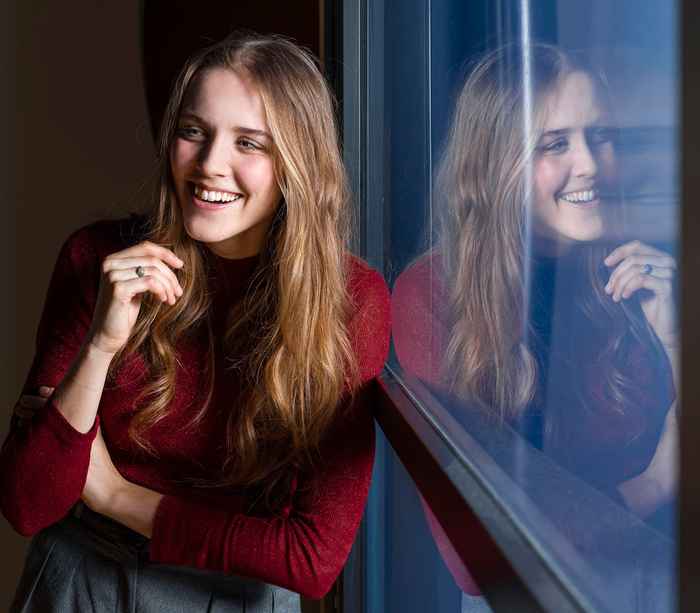Julia Schuring

Who? Julia Schuring (1996)
Studied: Bachelor’s in Physics and Astronomy
First job: service employee at Pathé Tuschinski cinema
Favourite place at the UvA: the library at Science Park, where it is always reasonably quiet. You have a view of a pond and the motorway, which is very calming.
Essential: mathematical insight and motivation
Julia Schuring (1996) is a Bachelor's student in Physics and Astronomy, a joint degree programme offered by the UvA and the VU. It was only when an enthusiastic secondary school teacher showed her what physics really is, and after encountering fascinating documentaries on Netflix and the Cosmos series, that she was certain that this was what she wanted to study. After all, it is part of human nature to wonder where we come from and what else is out there. As an added bonus, she has night-time access to the best optical telescope in the Netherlands, on the roof of the Science Park.
How unusual is this joint degree programme?
'Initially, I only wanted to study Astronomy. The combination sounded appealing to me because I was also very interested in physics. The great thing is that you can choose from courses in both disciplines and take part of your classes at the UvA and part at the VU Amsterdam. As a result, you are taught by the best lecturers at both universities, you can use the libraries at VU Amsterdam as well as at the UvA and you have an extra large number of courses from which to choose for your electives. The programme is research-oriented. This also means that you learn how to write a scientific report in your very first year, which I think that is really cool. The practical part of the programme is focused primarily on experimental research. The expertise of the researchers at both universities is one of the reasons why the practical courses are of high quality. In the first year, other than that, you take mostly introduction courses and learn the foundations of physics, quantum mechanics, wave optics and Newton's laws of motion. During the second year, you go deeper into the courses that you find interesting: if you discover in the first year that you like Astronomy the most, you can choose your electives accordingly in your second year. Ultimately, Physics proved more fascinating to me than Astronomy and I chose to go in that direction. The third year is all electives. You can also choose to minor in a totally different field, such as history or philosophy.’
We all want to know where we come from and what else is out there.
And now? What's your ‘Master’ plan?
‘Well, I want to do a Master's programme called GRAPPA: Gravitation, Astro, and Particle Physics, where you learn about particle physics, gravity and gravitational waves. After that, I think it would be fun to share physics-related knowledge with the public. For example, I would like to do what Robbert Dijkgraaf does on television: giving accessible, interesting lectures for people who are not scientists. I notice every day that people are fascinated by physics even when they understand nothing about it, perhaps because there is something spiritual about physics. It deals with the vital questions. Where do we come from, who are we, what is life? In physics, we try to approach these things scientifically and explain them with facts and research. When you decide to study Physics, you think you will find all the answers. In my experience, however, the more I know, the more questions I have.'
Physics may seem like a degree programme for boys; fortunately, more and more girls are becoming interested in it.
What do you enjoy most about your degree programme?
‘There are two huge telescopes on the Science Park roof. They are the best optical telescopes in the Netherlands, specifically intended for students, from first-year students to Master's students. If you need the telescopes for research, you can spend the night at the university and use them. We spent a night on the roof as a practical during the first year, which was very cool.’
You are taught by the best lecturers at both the VU Amsterdam and the UvA. You can't beat that!
Is the programme still virtually all-male? Or is that an outdated perception?
‘The majority of the students are still male, but luckily more and more girls are becoming interested in this field. Fortunately, I practically don't notice the presence of so many guys in my year. I have noticed that the girls tend to show up more. They work together more and are highly motivated, possibly because they are more inclined than the boys to doubt whether they can pull off their studies. As a student, you also kind of assume the identity of your degree programme and your university, which in my case is two universities. The students here are pretty strong-minded. For the most part, that is because we are challenged to think for ourselves, to look beyond what we are taught. To ask impudent questions. I like the contact with the lecturers; you learn to work together with people who have been in the field for some time. Maybe that also contributes to the students' assertiveness. Amsterdam students are proud of themselves and their university, but they also have a sort of “anti-attitude”. Challenging authority kind of goes with the territory.’